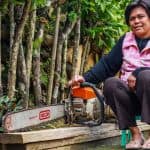‘We Need Dignified Jobs’: How a Human Trafficking Survivor Sparked a Social Enterprise to Empower Victims of Exploitation
For Texas-based entrepreneur Vanessa Bouché, social development through enterprise started with pushback from the women she was trying to help. Bouché, a human trafficking scholar, led a study abroad program to India in 2017 to introduce her college students to the reality of trafficking and learn how best to aid women trafficked in Delhi’s worst brothels. As she was interviewing the women, a woman named Pushpa had an unexpected response. “You’re no different than those who exploit us for our bodies, but you exploit us for our stories!” Bouché asked her what she really needed. It wasn’t the supplies that Bouché and her team had brought. It wasn’t a handout of any kind, or even a dramatic rescue involving the local police. Instead, Pushpa said, “We need dignified jobs to get out of this dirty business.”
Pushpa needed a viable alternative to the life of exploitation she was living. Bouché promised to help and started looking for a job for her. But no one was willing to hire a woman who couldn’t read or write or do math, had no professional experience, and was seen as a societal outcast.
So Bouché started a business to give Pushpa a job. Now she works with eight other sex trafficking survivors at Savhera — a wellness-focused social enterprise whose mission is to give dignified employment to women who have survived sexual exploitation.
Today, Savhera employs survivors in both the U.S. and India. Just like in India, trafficking survivors in the U.S. face significant barriers to employment. For instance, when Ava — a survivor in the U.S. — met the Savhera team, she had already been freed from her trafficker and was in a restoration program at one of Savhera’s partner organizations. But her hope for the future was still uncertain, as no one was willing to hire her. Potential employers turned her away because she had a criminal record from her exploitation, was on probation and still wore an ankle monitor, and had no job experience, no bank account and just a GED. Surviving wasn’t as simple as getting away from her trafficker. She needed someone to believe in her potential.
Human Trafficking Survivors Face Barriers Even After They are ‘Free’
One of the biggest myths about human trafficking is that victims can escape if they really want to. The truth is that some of the biggest barriers trafficking survivors face include acute psychological abuse and strategic brainwashing. These forms of emotional manipulation make a trafficked woman feel she has no future or potential outside of trafficking, while also crippling her ability to function in the “normal” world. These tactics, combined with threats and physical abuse, are just some of the barriers that stand in the way of escape.
In India, it’s common for girls to be trafficked in brothels at very young ages and to have no contact with the outside world. Trafficking survivors face additional barriers such as stigmatization, ostracization by communities, no access to education, illiteracy, no technical skills, financial instability, poor physical and mental health, severe trauma, and post-traumatic stress disorder. This combined lack of physical, educational and emotional resources not only makes these women “unhireable,” but it also increases their vulnerability to exploitation, physical abuse, sexual violence and poverty.
How a Social Enterprise Model Can Provide Sustainable Support
Human trafficking survivors need more than rescue or a helping hand. They need jobs. As Pushpa said, dignified employment is the only sustainable path toward surviving trafficking in the long run. But as Ava’s struggles illustrate, getting hired after trafficking is harder than most of us imagine, as employers balk at criminal records and lack of professional work experience.
A social enterprise that provides jobs to vulnerable people must address those challenges. Trafficking survivors need not only job training but also emotional support to be able to function in the world after severe trauma. They need help filling the gaps that their exploitation has left in their lives.
To create dignified opportunities for trafficking survivors, social enterprises must provide a trauma-informed workplace, legal assistance, specialized healthcare and educational programs for employees.
Dignified Employment as Long-Term Empowerment
Savhera took those needs into account in designing the social enterprise model it uses to give jobs to trafficking survivors. It works with partner organizations in the U.S. and India to identify survivors who need jobs, then hires survivors and starts paying them even before they are qualified for the job. The sale of wellness products — some of which the survivors produce — generates the salaries for these women and helps sustain Savhera’s business.
In addition to competitive salaries, Savhera provides holistic development opportunities through its PIES human flourishing model, which covers development and healing in four critical spheres: physical, intellectual, economic and spiritual.
The physical sphere starts with safe, independent housing. Many trafficking victims have suffered extreme poverty, and constant physical and environmental threats. Empowerment for them means the ability to provide for their basic needs while also learning about nutrition, diet, exercise and sanitation.
The intellectual sphere of the PIES model includes literacy classes and technology training to break down the socioeconomic barriers caused by lack of education. Some employees started work at Savhera without having ever touched a writing utensil, while others have some degree of education. Savhera recognized that a successful human development model for trafficking survivors must be adaptable to their varying needs and education levels. It provides training that not only equips survivors for their current jobs but also empowers them to reenter society and work toward their newly identified dreams.
The economic part of the PIES model includes financial literacy classes. Many trafficking victims need to learn about budgeting and saving, opening a bank account, using debit cards, paying off debts, planning for the future and giving back to their communities. For many survivors, this might be the first time they are able to keep, access and securely store the money they earn.
Last but not least, the spiritual realm of the PIES model focuses on inner healing. To cultivate mindfulness, employees read and reflect on a meditation together every day. These meditations were written by Bouché and are based on Savhera’s corporate values, such as dignity, integrity and excellence. The goal of these exercises reflects a broader goal of human development — to prepare employees for success beyond their current roles. When they grow in holistic wellness, they have the capacity to handle their own life challenges, while also inspiring and supporting other people. This kind of human development structure also promotes organizational growth, as longer-term employees reach the point where they can start teaching and instructing more recent hires.
Now Ava is thriving as she pursues higher education, builds authentic community and works with Savhera’s team in Texas. “To me, this is not just a job,” she says. “I have found people who truly care for me and love me unconditionally.”
Pushpa — the woman who started it all — works with Savhera’s team in Delhi. Today, Pushpa is overcoming her past trauma in ways that not only speak to her own strengths, but that also help strengthen her community. Pushpa and her colleagues — fellow survivors of sex trafficking — are taking control of their personal finances, learning professional skills that prepare them for future career goals, and achieving other milestones. Their jobs as production associates with Savhera allow them to earn a living wage, receive healthcare and restoration services, and work in a trauma-informed office. They are helping to train new hires and leading their communities in initiatives focused on topics ranging from environmental sustainability to personal wellbeing.
Their success illustrates the real impact of social enterprise: empowering the vulnerable to reach their full potential.
Elsa Cruz works in marketing and public relations for Savhera, a wellness social enterprise that gives dignified employment to survivors of sex trafficking.
Photo courtesy of Savhera.
- Categories
- Social Enterprise
- Tags
- employment



